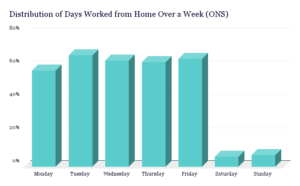Remember the days when you used to have to be in the office 9-5, 5 days a week? Those weren’t the days. Fortunately, with developments (and lockdowns), the way we work has evolved. Now you only need a laptop and internet and you can be working from home, the beach or even in the sky as you fly across the world.
However we understand remote working isn’t for everyone, and some still debate, ‘Are team members as productive when they’re not working in the office?’ In this blog, we’ll look into the data (stats) that show why you should be in or out of the office more.
Who is working remotely?
The ONS found that as of June 2023, the current working arrangements among UK employees are as follows:
- 10% worked from home all the time
- 29% worked from home some of the time
- 39% were unable to work from home
- 10% could work from home but chose not to
- 12% haven’t worked at all
They also found that depending on the day of the week depended on when people worked from home, with Tuesday being the most popular day. The split can be seen in the chart below.

StandOut CV found the demographics of remote workers as:
- Those aged 25-34 are more likely to work remotely (with 54% choosing to do so).
- Whereas those aged 16-24 are least likely to work remotely (with only 30% choosing to remote work).
- People based in London are most likely to work remotely.
- Those who have a degree are twice as likely to be able to gain remote work, as opposed to those who haven’t.
- Women are 2% more likely to work remotely than men.
The Guardian also reported that the UK has the largest number of remote workers when compared to the rest of Europe.
Issues with remote working
Whilst a study by Buffer found positives to remote working, they also found:
- 25% said they struggled to ‘unplug’ or switch off when working remotely.
- 24% reported feeling lonely and isolated.
- 45% said it was more difficult to achieve career growth when working remotely.
- 8% of UK workers didn’t go into their company office during the whole of 2021.
Advantages of working remotely
- Buffer reported that 61% of workers had a ‘very positive’ view of remote working.
- They also found that 97% of remote workers would recommend it to others.
- A survey by Global Workplace Analytics found that 95% of companies that allow their employees to work remotely said it has a high impact on employee retention.
- This was also confirmed by 36% of employees stating they would choose the benefit over a pay increase.
- A study in February 2022 found that more than three-quarters (78%) of home workers said being able to work remotely improved their work-life balance.
- The Guardian has reported that a LinkedIn poll found that more than a third of UK workers would quit their jobs if they were asked to return to the office full-time.
- Forbes found that over 55% of people said it was easier to concentrate when working from home and that only 46% said collaborative tasks are better when in the office.
- RingCentral conducted a survey in 2023 that involved 1,002 UK full-time workers aged 21 to 65. They found that 59% said they were more productive at home, compared to 34% of respondents saying they were more productive in the office.
- Google trend data shows the term ‘remote jobs’ has had 1.1M searches in the last month, a 28% increase YoY. Showing a keen interest in workers wanting this benefit when looking for work.

Conclusion
Ultimately there are pros and cons, but we strongly believe the pros outweigh the cons. Also, Statista’s findings that since 1998 and 2020, the number of remote workers has grown by 2.7 million, showing that the trend for remote working is only going to increase. Therefore businesses who want to recruit and retain staff, remote and hybrid working is something they should be open to offering. Want help with preparing your team and business for hybrid working? Then take a look at this helpful blog from our head of HR.
This is why hybrid working is a part of Embryo’s employee incentive package, and something many of our applicants mention during the recruitment process. If you’re looking for a new career which enables you to work remotely then take a look at the roles we have available.













